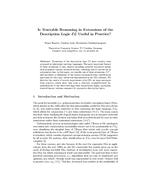Is Tractable Reasoning in Extensions of the Description Logic $\mathcal{EL}$ Useful in Practice?
Aus International Center for Computational Logic
Is Tractable Reasoning in Extensions of the Description Logic $\mathcal{EL}$ Useful in Practice?
F. BaaderF. Baader, C. LutzC. Lutz, B. SuntisrivarapornB. Suntisrivaraporn
F. Baader, C. Lutz, B. Suntisrivaraporn
Is Tractable Reasoning in Extensions of the Description Logic $\mathcal{EL}$ Useful in Practice?
Proceedings of the Methods for Modalities Workshop (M4M-05), 2005
Is Tractable Reasoning in Extensions of the Description Logic $\mathcal{EL}$ Useful in Practice?
Proceedings of the Methods for Modalities Workshop (M4M-05), 2005
- KurzfassungAbstract
Extensions of the description logic EL have recently been proposedas lightweight ontology languages. The most important feature of these extensions is that, despite including powerful expressive means such as general concept inclusion axioms, reasoning can be carried out in polynomial time. In this paper, we consider one of these extensions, EL+, and introduce a refinement of the known polynomial-time classification algorithm for this logic, which was implemented in our CEL reasoner. We describe the results of several experiments with CEL on large ontologies from practice, which show that even a relatively straightforward implementation of the described algorithm outperforms highly optimized,
state-of-the-art tableau reasoners for expressive description logics. - Forschungsgruppe:Research Group: AutomatentheorieAutomata Theory
@inproceedings{ BaaLutSun-M4M-05,
address = {Berlin, Germany},
author = {F. {Baader} and C. {Lutz} and B. {Suntisrivaraporn}},
booktitle = {Proceedings of the Methods for Modalities Workshop (M4M-05)},
title = {Is Tractable Reasoning in Extensions of the Description Logic $\mathcal{EL}$ Useful in Practice?},
year = {2005},
}
